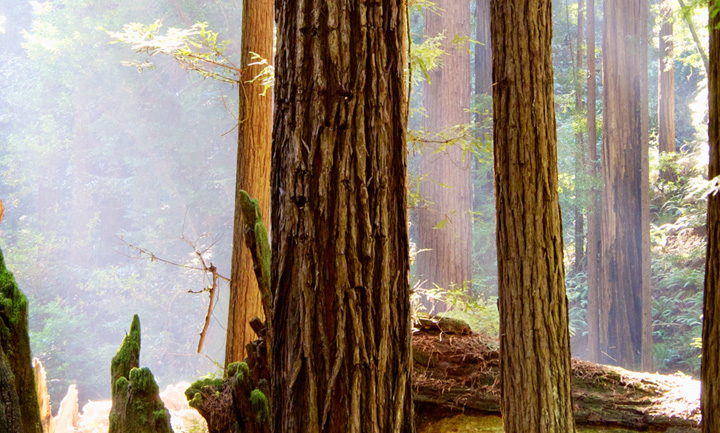John Muir once said “the clearest way into the Universe is through a forest wilderness.” John Muir was a Scottish-American influential naturalist and conservationist, an early advocate for the preservation of wilderness in the United States.
He was one to acknowledge the power in the forest and natural world, the bewilderment of the wilderness. Preserving the wilderness is an essential part of the conservationist movement, and essential to the wellbeing of the planet. Beyond this, presence in nature allows humans to tap into the greater power of the natural world, and measure ourselves both against and within the larger picture of nature. This sense of awe helps us behave in more generous ways, lessening the ego identity of feeling entitled and selfish and instead moving towards a larger comprehension of the whole.
As popular outdoor activities like walking, hiking, and trekking prove, many humans feel an innate pull to the wild. Where tall coniferous trees group together to form rolling or ragged streaks of green, and damp dark earth provides a cushion for brush and exploration, a sense of union and peace can be felt. After time spent in the forest, we often feel more at ease, clear, energetic, and revitalized. Numerous studies have proven what we know about spending in time in nature – that it makes us happier and healthier.
Forest bathing or shinrin-yoku. means taking in the forest through the senses. It involves a more concentrated and slower practice than jogging or hiking, and bridges the gap to the natural world. A sense of comfort is felt through experiencing the sounds of the forest, the sunlight passing through the leaves, the taste of the fresh air, and the scent of the trees. Researchers in Japan have linked forest bathing with lower levels of the blood pressure-raising stress hormone cortisol, as well as the increase of a type of white blood cell that fights infections and inflammation, supporting the immune system. Qing Li, an associate professor from the Hygiene and Public Health department at Nippon Medical School in Tokyo, studied phytoncides, the name for breathable substances produced by trees and other plants. Dr. Li found a correlation between increased exposure to phytoncides and better health after testing subjects who went on daytrips into the forest.
But as our lives become more concentrated in cities, indoors, and separate from nature, a return to the forest or even just the outdoors can be a challenge for some. Startlingly, the average American spends 93% of their life indoors, according to the EPA, and nearly 70% of the world population is expected to live in urban areas by 2050, the UN reports. The good thing is, we can still reap the benefits of nature and integrate them into modern life, without a daily mountain climb – research shows that even if artificial, the images, sounds and smells of nature can have positive health effects. For instance, the sound of a burbling stream to soothe and de-stress, the sight of plants indoors to improve mood and outlook, and the scent of forest aromas to regulate and relieve are all common practices today.
Forest aromas can be found in coniferous and woody essential oils like pine, cypress, and juniper. Using these fragrances can evoke the same calming and positive qualities of the forest itself, both as atmospheric and as a mind-body exploration of the scent. Cypress is bright and centering, grounding yet rising in its motion. With its dark foliage as a cone shaped evergreen tree growing up to 80 feet tall, the essence of its rising can be seen and felt through its scent. Juniper, a more fruity, fresh, woody shrubby looking tree which grows to 30 ft., enlivens with that quintessential woody aspect we come to expect from a forest type scent. Cedarwood is a soft sweet, woody warm evergreen tree which is also called satin wood, and is a common ingredient in perfumery, a mid tone and texture wood. Pine, a crispier needlelike tree growing to 130 ft. tall, provides a refreshing sharp and slightly sweet aspect. The earthy and invigorating aromas of the forest tend to be centering and cleansing, a key antidote when feeling anxious or stressed. Some Air Aroma fragrances to explore in these styles include Cedar Mood, Holiday Tree, Alpine Air, and Breathe Easy.
Bring the quiet atmosphere and beautiful scenery of the forest to your attention, focusing effortlessly on the scents, sights, and sounds of nature, and experience a sense of being and belonging. To quote John Muir once more, “Between every two pines is a doorway to a new world.”
